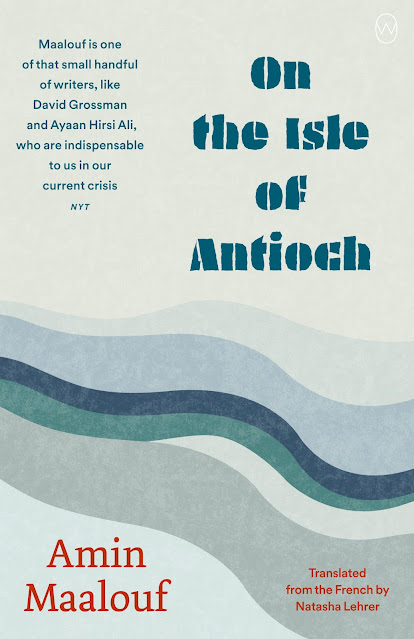On the Isle of Antioch
by Amin Maalouf
Translated from the French by Natasha Lehrer
About twenty years ago, a friend had lent me Amin Maalouf’s Balthasar’s Odyssey. Two decades later, the details of the plot escape me, but I still recall being entranced by a novel which was at once a wildly gripping narrative and an intellectually satisfying work. I hadn’t read any Maalouf since then, so I had great expectations about his latest novel, On the Isle of Antioch. Its protagonist and narrator is “Alec Zander”, a lawyer turned cartoonist who, as a result of a strange quirk of family history, owns the greater part of Antioch, a remote island in the Atlantic. The island is linked to a the larger neighbouring island through a causeway which appears at low tide. Otherwise, Alec is all alone, except for Ève, a reclusive and misanthropic female author who owns another part of Antioch, and who has settled there to escape attention, following the publication of a cult work of fiction in her youth. One day, there is a massive power failure, accompanied by a breakdown in internet and radio communication. Alec suspects that a long-feared nuclear armageddon has arrived. It eventually results that behind these unprecedented events there is a mysterious and highly-advanced society of individuals who call themselves the Friends of Empedocles, and who appear to be inspired by the values of the Ancient Greeks. The Friends of Empedocles declare that they come in peace. But can they be trusted and does their advent signal the collapse of civilisation as we know it?
Certainly, the novel’s premise is promising. Here is Amin Maalouf, a veritable and venerable man of letters, taking on a hoary trope of dystopian/post-apocalyptic fiction and turning it into a philosophical meditation on the state of humanity. Yet, I found the novel ultimately underwhelming. Let me try to explain why.
So, first, the plot. Maalouf goes for a first person narration, which certainly makes matters more exciting and “immersive”. But for the purposes of plot development, the novel’s protagonist needs to double as a third-person omniscient narrator. To justify this, Maalouf relies on a series of extraordinary coincidences. Alec lives on a remote island. Yet, his only neighbour turns out to be the “muse” of the Friends of Empedocles, one of his friends is a member of the shadowy group and, to top it all, the closest advisor of the President of the US happens to be an old companion from University, such that, ironically Alec becomes probably the best-informed person in the world about the cataclysmic developments. In my view, even the most “speculative” of “speculative fiction”, needs to follow an internal logic to be credible, and sometimes this novel simply requires too much suspension of disbelief.
The novel borrows popular and genre fiction, and I’m perfectly fine with that. There’s action, dystopian thrills, and some romance. But the narrative arc seems to fizzle out. Without revealing too many details of the plot, there is some closure from the perspective of the narrator, but many questions remain unanswered. In other words, whoever reads this merely for the thrill of the tale will likely end up disappointed.
As for its philosophical ruminations, the novel does raise some interesting queries about contemporary society, the decline of civilisation, the diffident encounters between cultures. But these themes are alluded to without being considered too deeply.
Don’t get me wrong. I can’t say I disliked the novel. After all, Maalouf on a bad day is still better than most. But equally I cannot shake off a sense that On the Isle of Antioch could have been much more.








No comments:
Post a Comment